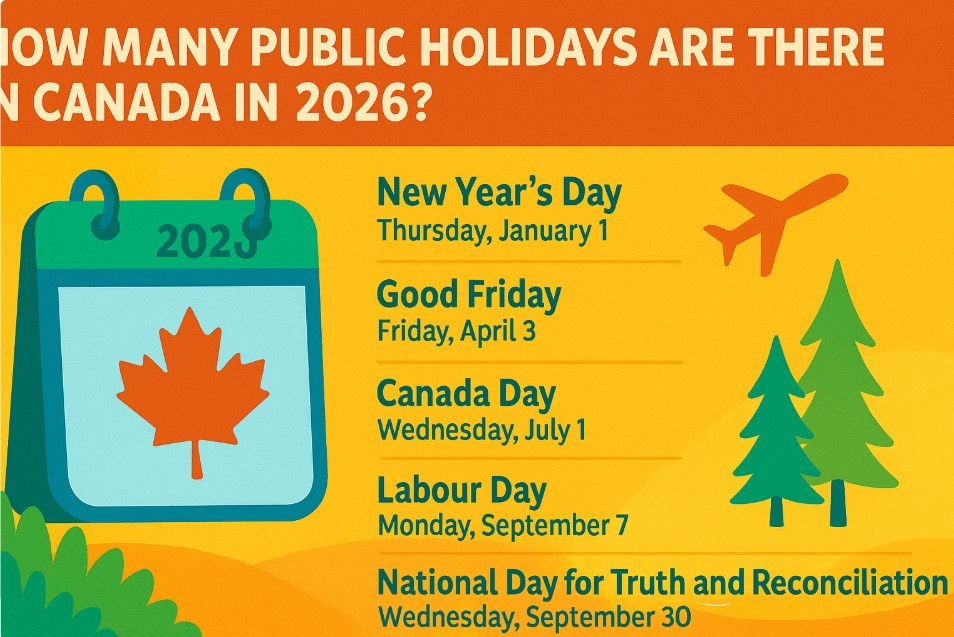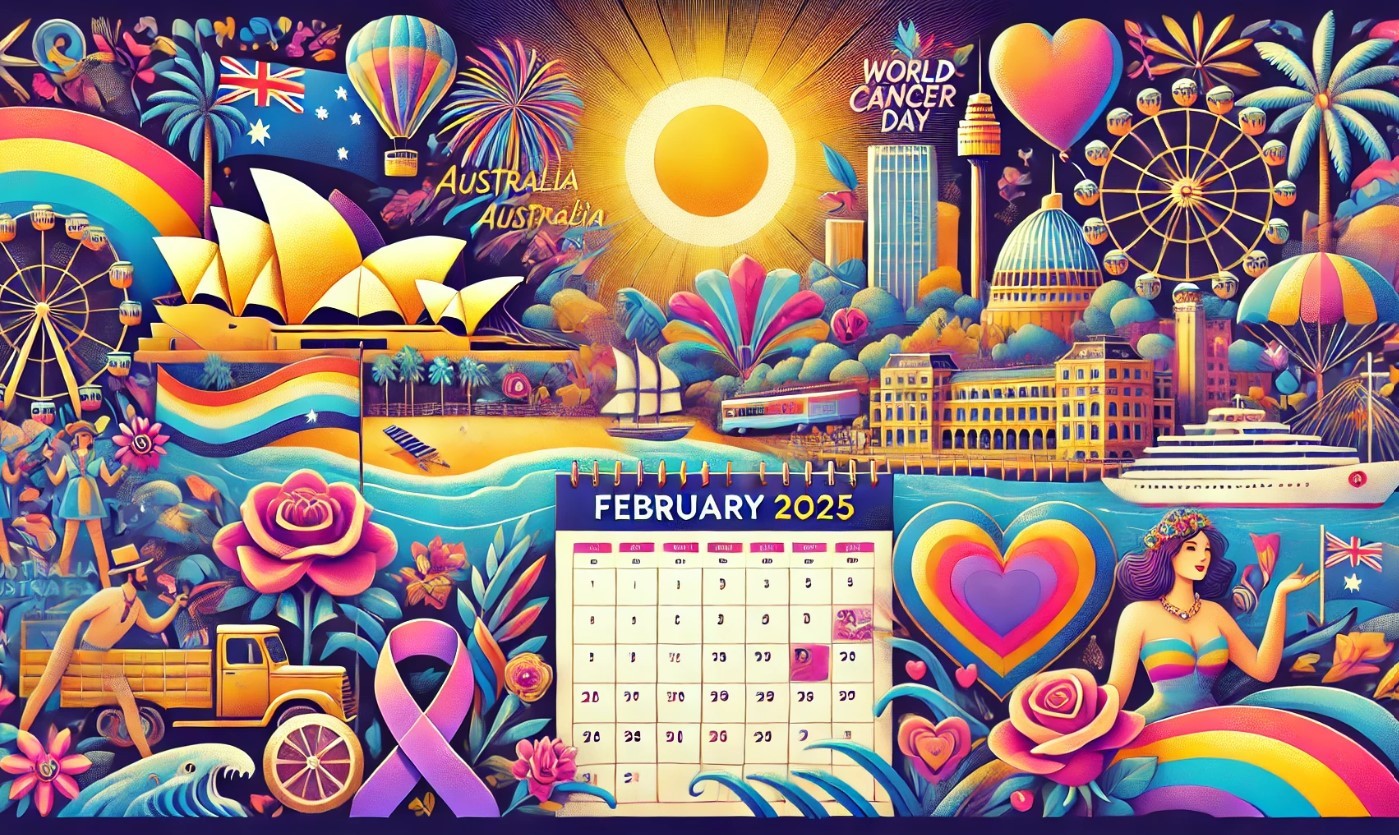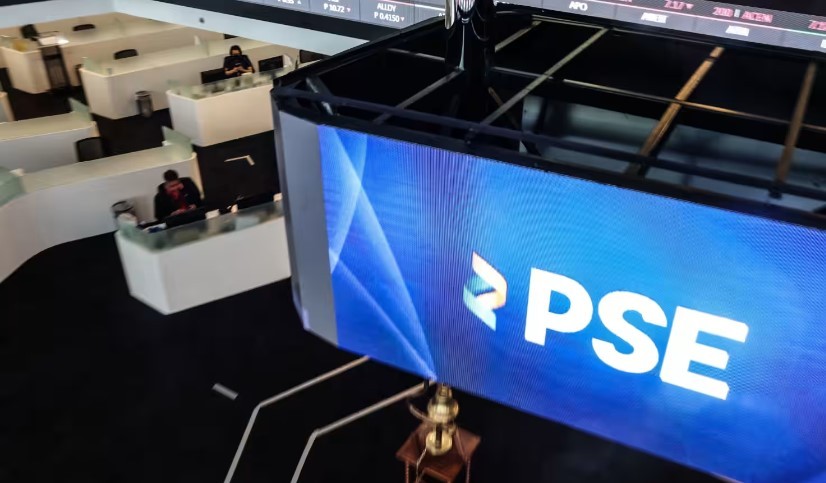The Most Important Public Holidays In Malaysia In 2021
 |
Public holidays in Malaysia are regulated at both federal and state levels, mainly based on a list of federal holidays observed nationwide plus a few additional holidays observed by each individual state and federal territory. The public holidays are a mix of secular holidays celebrating the nation and its history, and selected traditional holidays of the various ethnic and religious groups that make up the country.
The legislation governingpublic holidays in Malaysia includes the Holidays Act 1951 (Act 369) in Peninsular Malaysia and Labuan, the Holidays Ordinance (Sabah Cap. 56) in Sabah and the Public Holidays Ordinance (Sarawak Cap. 8) in Sarawak.
The workweek and weekend varies between states, with most states and federal territories observing a Saturday–Sunday weekend, while Johor, Kedah, Kelantan and Terengganu observe a Friday–Saturday weekend, though in Johor many private businesses and banks observe the Saturday–Sunday weekend due to close business ties with Singapore. In states and territories with a Saturday–Sunday weekend, a public holiday that falls on Sunday is substituted by a holiday on Monday, or the next working day if Monday itself is a public holiday. In Johor and Kedah, a public holiday that falls on Friday is replaced by Sunday or the next working day, while in Kelantan and Terengganu, a public holiday that falls on Saturday is replaced by Sunday or the next working day.
The list of Malaysia official public holidays in 2021
Date | Holiday | States applicable |
| Friday, 1 January | New Year’s Day | All except Johor, Kedah, Kelantan, Perlis, Terengganu |
| Thursday, 28 January | Thaipusam | Johor, Kuala Lumpur, Negeri Sembilan, Penang, Perak, Putrajaya, Selangor |
| Monday, 1 February | Federal Territory Day | Kuala Lumpur, Labuan, Putrajaya |
| Friday, 12 February | Chinese New Year | All |
| Saturday, 13 February | Chinese New Year Day 2 | All |
| Thursday, 11 March | Israk and Mikraj | Kedah, Negeri Sembilan, Perlis, Terengganu |
| Friday, 2 April | Good Friday | Sabah, Sarawak |
| Tuesday, 13 April | Awal Ramadan | Johor, Kedah, Melaka |
| Thursday, 29 April | Nuzul Al-Quran | All except Johor, Kedah, Melaka, Negeri Sembilan, Sabah, Sarawak |
| Saturday, 1 May | Labour Day | All |
| Thursday, 13 May* | Hari Raya Puasa | All |
| Friday, 14 May* | Hari Raya Puasa Day 2 | All |
| Wednesday, 26 May | Wesak Day | All |
| Sunday, 30 May | Harvest Festival | Labuan, Sabah |
| Monday, 31 May | Harvest Festival Day 2 | Labuan, Sabah |
| Monday, 7 June | Yang di-PertuanAgong’s Birthday | All |
| Tuesday, 20 July* | Hari Raya Haji | All |
| Wednesday, 21 July* | Hari Raya Haji Day 2 | Kedah, Kelantan, Perlis, Terengganu |
| Tuesday, 10 August* | Awal Muharram | All |
| Tuesday, 31 August | Merdeka Day | All |
| Thursday, 16 September | Malaysia Day | All |
| Tuesday, 19 October | Prophet Muhammad’s Birthday | All |
| Thursday, 4 November* | Deepavali | All except Sarawak |
| Saturday, 25 December | Christmas | All |
*Dates are subject to change
Important Holidays Observed in Malaysia 2021
Chinese New Year / Spring Festival
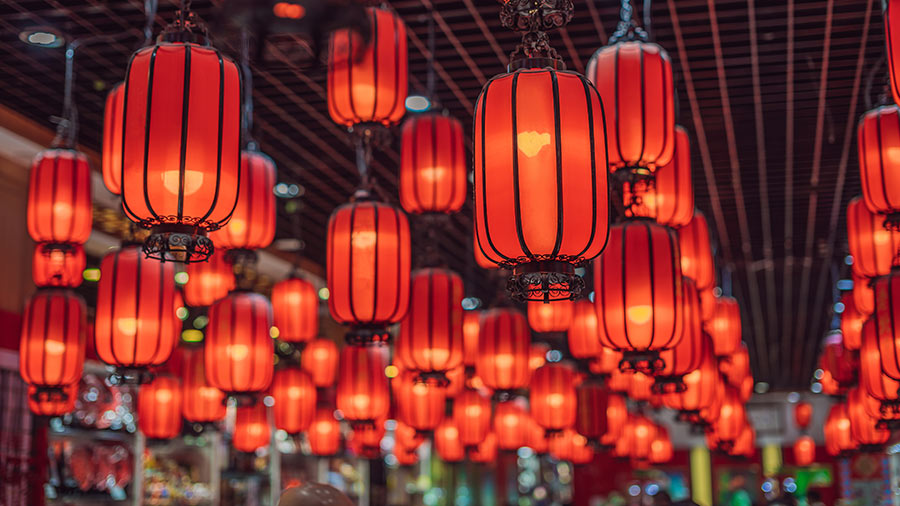 |
| Photo: Chinese Briefing |
Chinese New Year, Spring Festival or the Lunar New Year, is the festival that celebrates the beginning of a new year on the traditional lunisolar Chinese calendar. In Chinese culture and Asian countries within Sinosphere, the festival is also commonly referred to as Spring Festival as the spring season in the lunisolar calendar traditionally starts with lichun, the first of the twenty-four solar terms which the festival celebrates around the time of the Lunar New Year. Marking the end of winter and the beginning of the spring season, observances traditionally take place from New Year’s Eve, the evening preceding the first day of the year to the Lantern Festival, held on the 15th day of the year. The first day of Chinese New Year begins on the new moon that appears between 21 January and 20 February.
Chinese New Year is one of the most important holidays in China, and has strongly influenced Lunar New Year celebrations such as the Losar of Tibet (Tibetan: ལོ་གསར་), and of China's neighbouring cultures, including the Korean New Year (Korean: 설날, seollal), and the Tết of Vietnam. It is also celebrated worldwide in regions and countries that house significant Overseas Chinese or Sinophone populations, including Taiwan, Singapore, Indonesia, Malaysia, Myanmar, Thailand, Cambodia, the Philippines, Mauritius, and Canada as well as in North America and Europe.
The Chinese New Year is associated with several myths and customs. The festival was traditionally a time to honour deities as well as ancestors. Within China, regional customs and traditions concerning the celebration of the New Year vary widely, and the evening preceding the New Year's Day is frequently regarded as an occasion for Chinese families to gather for the annual reunion dinner. It is also traditional for every family to thoroughly clean their house, in order to sweep away any ill-fortune and to make way for incoming good luck. Another custom is the decoration of windows and doors with red paper-cuts and couplets. Popular themes among these paper-cuts and couplets include that of good fortune or happiness, wealth, and longevity. Other activities include lighting firecrackers and giving money in red paper envelopes.
Deepavali Southern / Diwali Krisna Chaturdasi
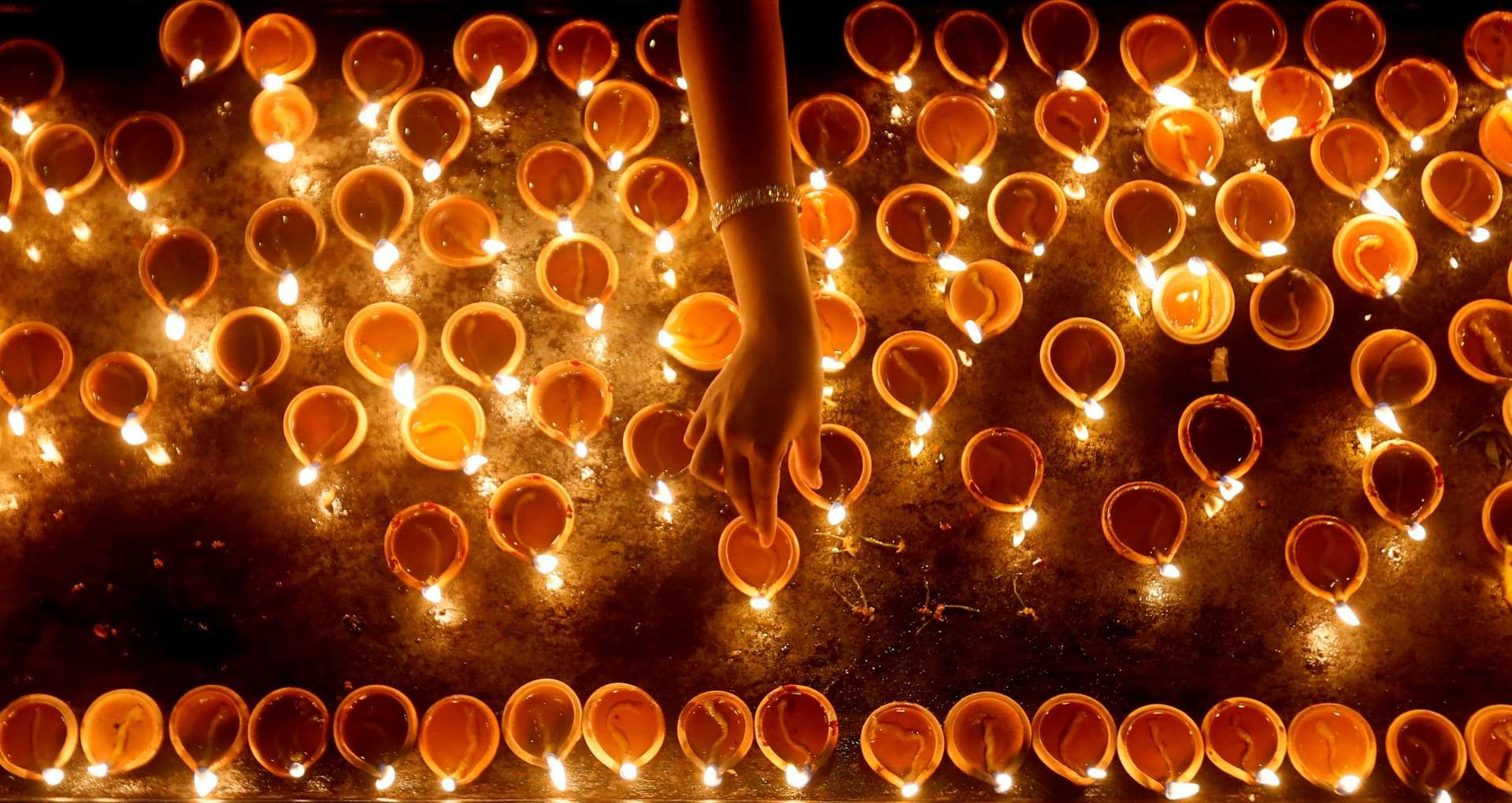 |
| Photo: Getty Images |
Deepavali, or also known as Diwali, is a festival of lights celebrated by those of Hindu faith. It is one of the most important festivals of the year for the Hindus who celebrate by performing traditional customs at homes. Just like most major celebrations by other communities, Deepavali is a time for family reunions. Deepavali is an official holiday in Malaysia as well as in some Asian countries like India, Myanmar, Mauritius and in non-Asian countries like Guyana, Trinidad and Tobago, Suriname as well as Fiji.
Small clay lamps filled with oil are lighted to signify the triumph of good over evil, and the lights are kept on during the night. Homes are cleaned prior to the festival to welcome the goddess Lakshmi. And of course, shopping and cooking are must-dos but are most likely the most fun activities. Little India would be the best choice to shop for saris, bangles and spices for Deepavali, as well as to soak up the festive spirit. Decorations such as colorful paper lanterns and kolam are also put up to decorate the home. The kolam is an intricate design on the floor made from coloured rice and colored powder. The outcome is indeed amazing as much effort and skills are needed to create a colorful kolam. You can see beautiful kolams at many shopping mall entrances during the weeks before Deepavali.
At the dawn of Deepavali, Hindus perform a ritual oil bath which signifies the cleansing of the body and soul. Then, they put on new clothes before performing prayers at home and in temples. Once prayers are finished, celebrants often hold open houses where family and friends are encouraged to drop by to share conversation, enjoy snacks or meals and celebrate the beginning of a new year together. Firecrackers are also set off to scare evil spirits away. Just like the other festivals in Malaysia, Deepavali is a great occasion for people of all races and religions to come together to celebrate culture over tasty food and good companionship.
Eid al Adha / Feast of Sacrifice
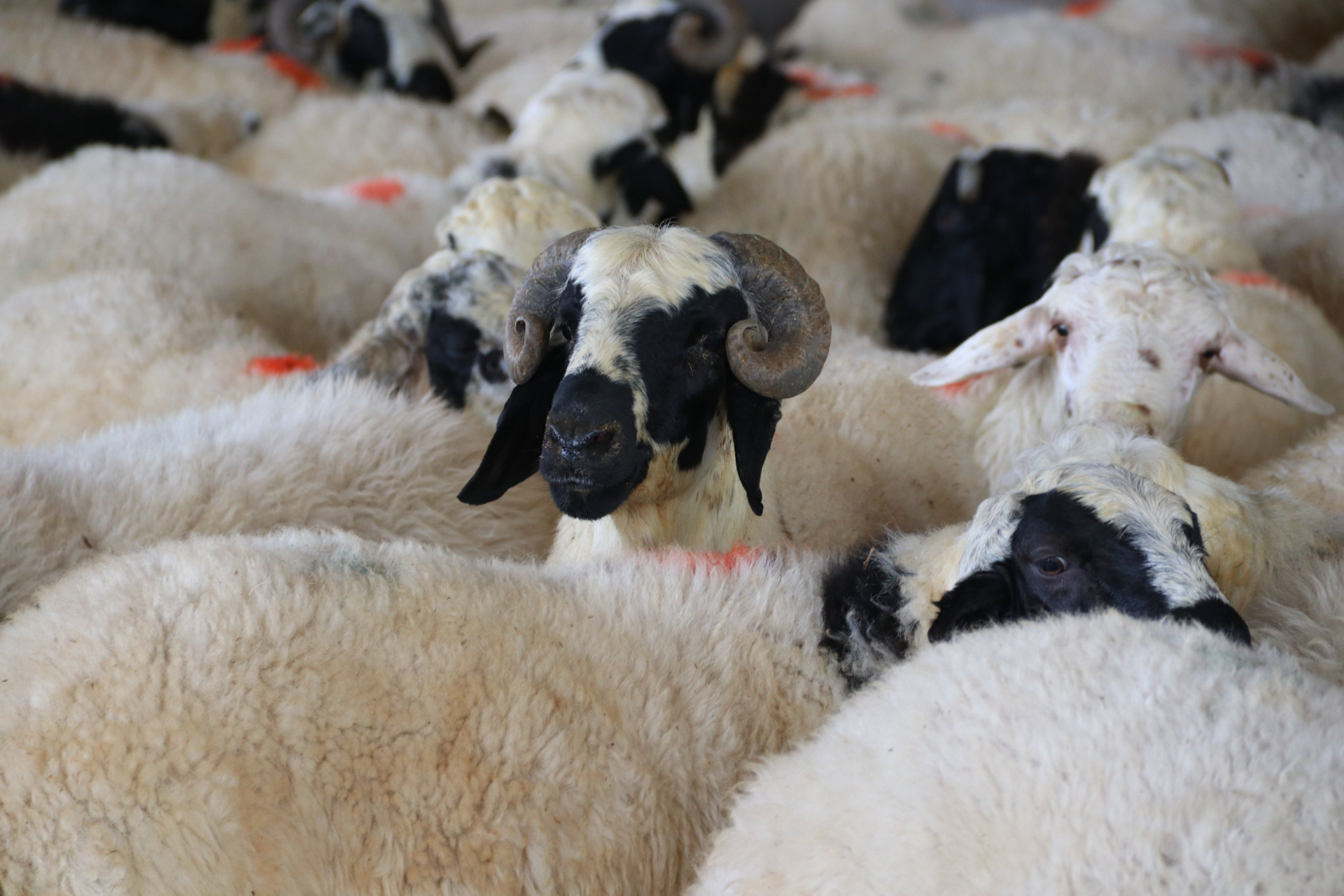 |
| Photo: Daily Sabah |
Eid al-Adha (or Eid al-Azha and Eidul Azha; /ˌiːd əl ˈɑːdə, - ˈɑːdhɑː/ EED əl AH-də, - AHD-hah; Arabic: عيد الأضحى, romanized: ʿĪd al-ʾAḍḥā, lit. 'Feast of the Sacrifice', IPA: [ʕiːd al ˈʔadˤħaː]) is the latter of the two Islamic holidays celebrated worldwide each year (the other being Eid al-Fitr). It honours the willingness of Ibrahim (A.S) (Abraham) to sacrifice his son Ismail (Ishmael) as an act of obedience to God's command. (The Jewish and Christian religions believe that according to Genesis 22:2, Abraham took his son Isaac to sacrifice.) Before Ibrahim could sacrifice his son, however, Allah provided a lamb to sacrifice instead. In commemoration of this intervention, animals are sacrificed ritually. One third of their meat is consumed by the family offering the sacrifice, while the rest is distributed to the poor and needy. Sweets and gifts are given, and extended family are typically visited and welcomed.
In the Islamic lunar calendar, Eid al-Adha falls on the 10th day of Dhu al-Hijjah, and lasts for four days. In the international (Gregorian) calendar, the dates vary from year to year, shifting approximately 11 days earlier each year.
Eid al Fitr / End of Ramadan
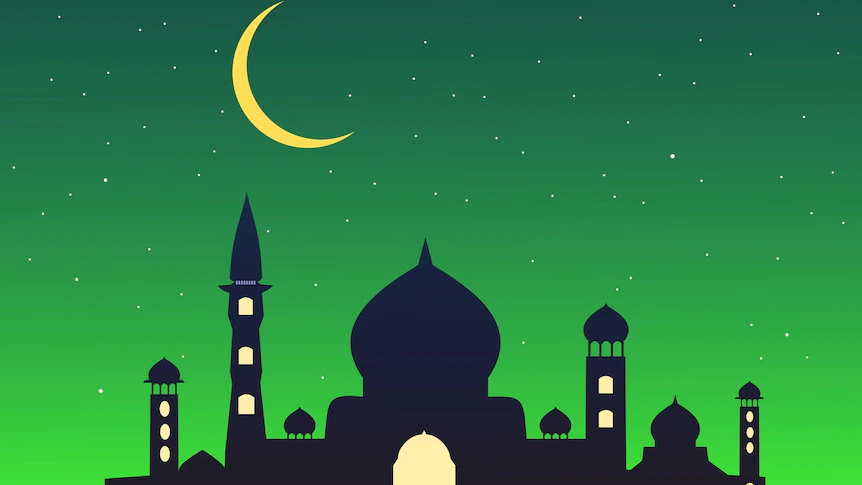 |
| Photo: abc |
Eid al-Fitr (/ˌiːd əl ˈfɪtər, -trə/ EED əl FIT-ər, -rə; Arabic: عيد الفطر, romanized: ʿĪd al-Fiṭr, lit. 'Feast of Breaking the Fast', IPA: [ʕiːd al ˈfitˤr]), also called the "Festival of Breaking the Fast" or Lesser Eid, or simply Eid, is a religious holiday celebrated by Muslims worldwide that marks the end of the month-long dawn-to-sunset fasting of Ramadan. It falls on the first day of Shawwal in the Islamic calendar; this does not always fall on the same Gregorian day, as the start of any lunar Hijri month varies based on when the new moon is sighted by local religious authorities. The holiday is known under various other names in different languages and countries around the world.
Eid al-Fitr has a particular salat (Islamic prayer) that consists of two rakats (units) generally performed in an open field or large hall. It may only be performed in congregation (jamāʿat) and features six additional Takbirs (raising of the hands to the ears while saying "Allāhu ʾAkbar", meaning "God is the greatest") in the Hanafi school of Sunni Islam: three at the start of the first rakat and three just before rukūʿ in the second rakat. Other Sunni schools usually have 12 Takbirs, similarly split in groups of seven and five. In Shia Islam, the salat has six Takbirs in the first rakat at the end of qira'a, before rukūʿ, and five in the second. Depending on the juristic opinion of the locality, this salat is either farḍ (فرض, obligatory), mustaḥabb (strongly recommended) or mandūb (مندوب, preferable). After the salat, Muslims celebrate the Eid al-Fitr in various ways[8] with food ("Eid cuisine") being a central theme, which also gives the holiday the nickname "Sweet Eid" or "Sugar Feast".
International Labour Day / Labour Day
International Workers' Day, also known as Labour Day in most countries and often referred to as May Day, is a celebration of labourers and the working classes that is promoted by the international labour movement and occurs every year on May Day (1 May).
While it may belong to a tradition of spring festivals, the date was chosen in 1889 for political reasons by the Marxist International Socialist Congress, which met in Paris and established the Second International as a successor to the earlier International Workingmen's Association. They adopted a resolution for a "great international demonstration" in support of working-class demands for the eight-hour day. The date had been chosen by the American Federation of Labor to continue an earlier campaign for the eight-hour day in the United States, which had culminated in the Haymarket affair, which occurred in Chicago on 4 May 1886. May Day subsequently became an annual event.The 1904 Sixth Conference of the Second International, called on "all Social Democratic Party organisations and trade unions of all countries to demonstrate energetically on the First of May for the legal establishment of the eight-hour day, for the class demands of the proletariat, and for universal peace."
Islamic Hijra New Year
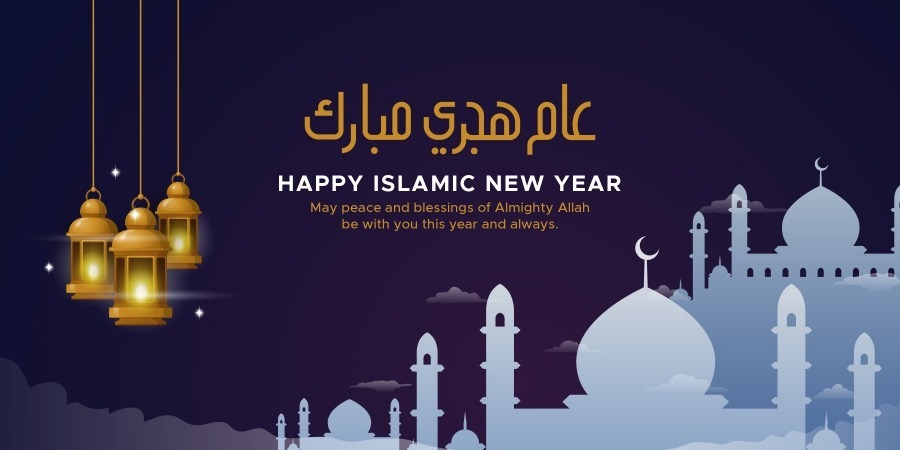 |
| Photo: Coming Soon in UEA |
The Islamic New Year (Arabic: رأس السنة الهجرية, Raʿs as-Sanah al-Hijrīyah), also called the Hijri New Year or Arabic New Year, is the day that marks the beginning of a new lunar Hijri year, and is the day on which the year count is incremented. The first day of the Islamic year is observed by most Muslims on the first day of the month of Muharram. The epoch (reference date) of the Islamic era was set as 622 Common Era (CE), the year of the emigration of Muhammad and his followers from Mecca to Medina, known as the Hijra. All religious duties, such as prayer, fasting in the month of Ramadan, and pilgrimage, and the dates of significant events, such as celebration of holy nights and festivals, are calculated according to the Islamic calendar.
While some Islamic organizations prefer determining the new month (and hence the new year) by local sightings of the moon, most Islamic institutions and countries, including Saudi Arabia, follow astronomical calculations to determine future dates of the Islamic calendar. There are various schemas for calculating the tabular Islamic calendar (i.e. not based on observation), which results in differences of typically one or even two days between countries using such schema and those that use lunar sightings. For example, the Umm al-Qura calendar used in Saudi Arabia was reformed several times in recent years. The current scheme was introduced in 1423 AH (15 March 2002).
Start of Ramadan
Ramadan (Arabic: رَمَضَان, romanized: Ramaḍān [ra.ma.dˤaːn]), also spelled Ramazan, Ramzan, Ramadhan or Ramathan, is the ninth month of the Islamic calendar, observed by Muslims worldwide as a month of fasting (sawm), prayer, reflection and community. A commemoration of Muhammad's first revelation, the annual observance of Ramadan is regarded as one of the Five Pillars of Islam and lasts twenty-nine to thirty days, from one sighting of the crescent moon to the next.
Fasting from dawn to sunset is fard (obligatory) for all adult Muslims who are not acutely or chronically ill, travelling, elderly, breastfeeding, diabetic, or menstruating. The predawn meal is referred to as suhur, and the nightly feast that breaks the fast is called iftar. Although fatwas have been issued declaring that Muslims who live in regions with a midnight sun or polar night should follow the timetable of Mecca,it is common practice to follow the timetable of the closest country in which night can be distinguished from day.
The spiritual rewards (thawab) of fasting are believed to be multiplied during Ramadan. Accordingly, Muslims refrain not only from food and drink, but also tobacco products, sexual relations, and sinful behavior, devoting themselves instead to salat (prayer) and recitation of the Quran.
READ MORE OF THE ARTICLE BELOW!
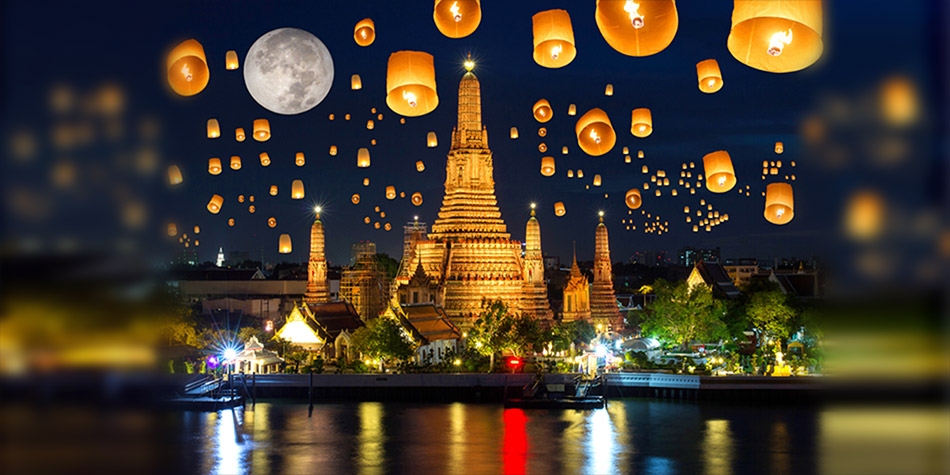 The Most Important Public Holidays In Thailand in 2023 The Most Important Public Holidays In Thailand in 2023 When planning your trip to Thailand, it is important to keep track of the major national holidays celebrated throughout the country. Check out the list ... |
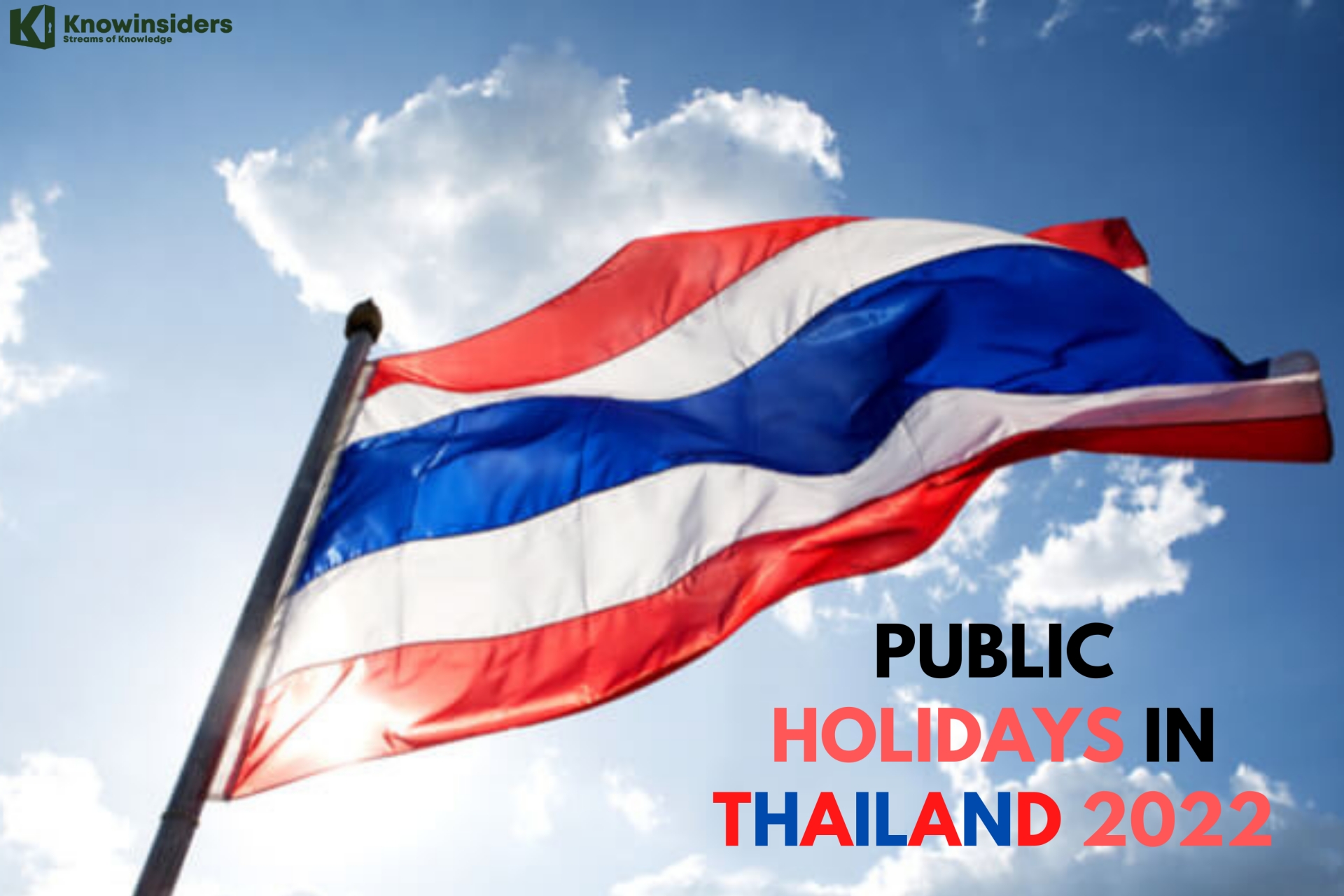 The Most Important Public Holidays in Thailand In 2022 The Most Important Public Holidays in Thailand In 2022 Have a look at a list of public holidays in Thailand and take note in the calendar! |
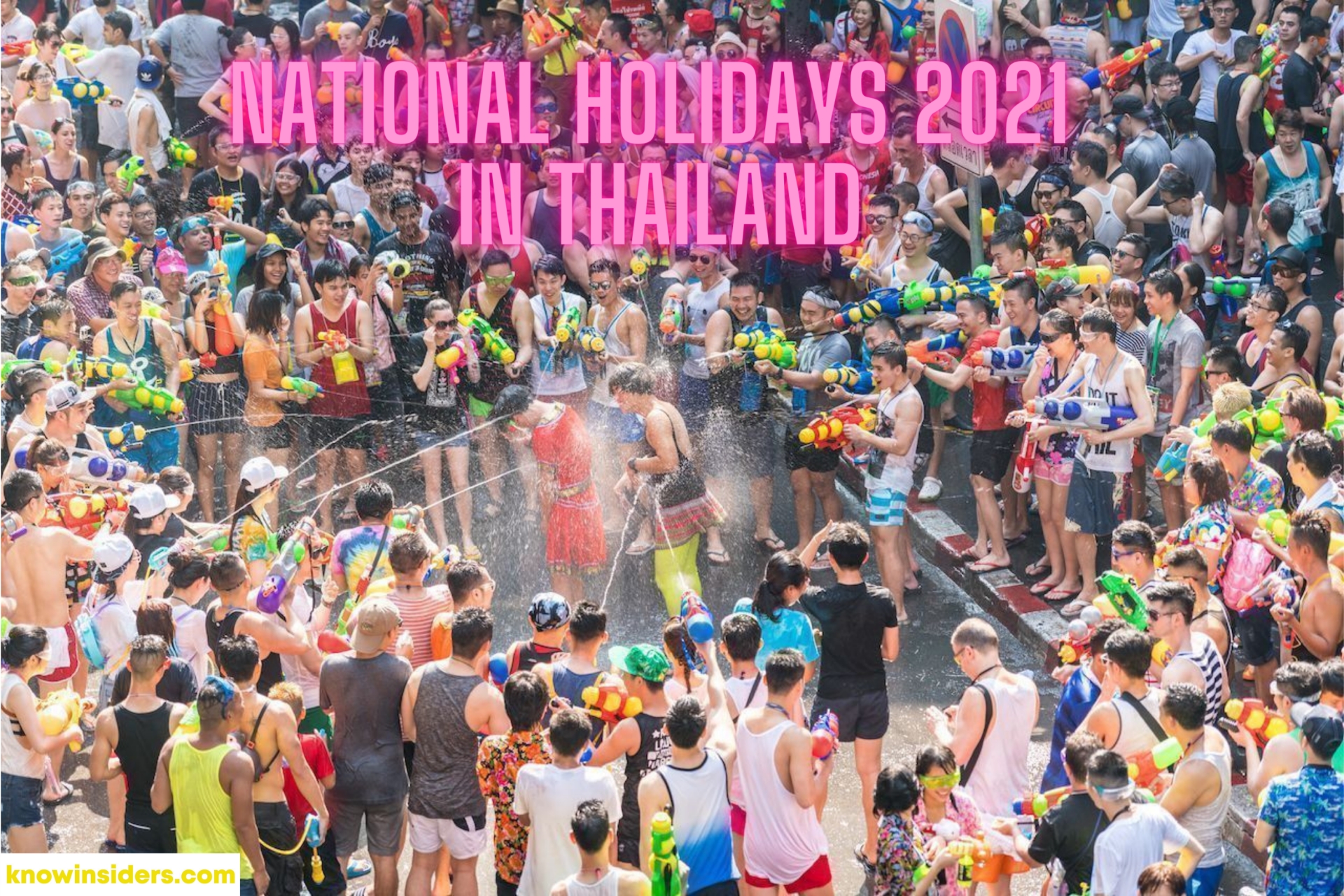 The Most Important Public Holidays In Thailand In 2021 The Most Important Public Holidays In Thailand In 2021 Thailand is a Buddhist country, many religious festivals are public holidays while some historical dates and the anniversaries of ... |
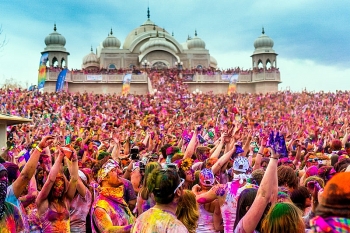 India Holidays 2021: Accurate Schedule and List India Holidays 2021: Accurate Schedule and List India Holidays 2021: Knowinsider is going to introduce readers list, schedule, calendar, type and activities of public holidays and observances in India in 2021. ... |

